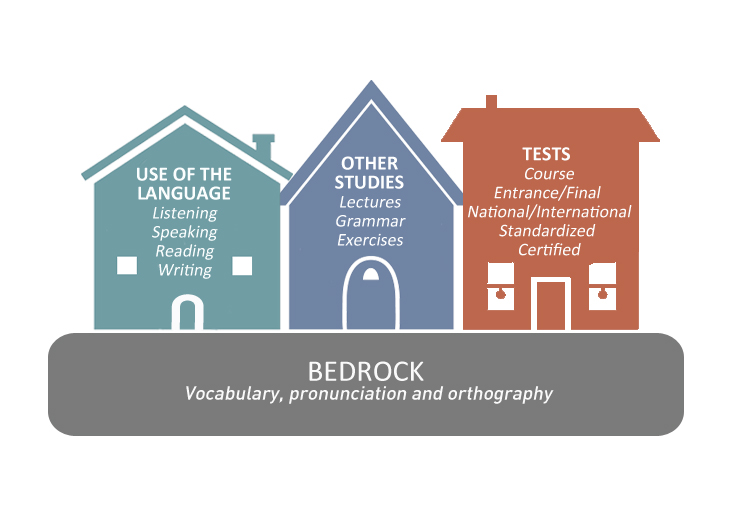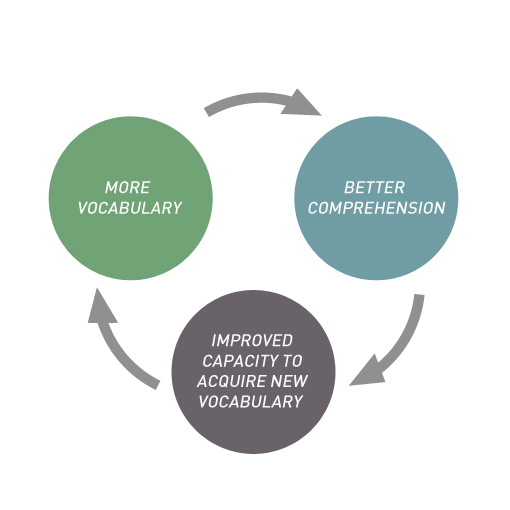As discussed in the first post, vocabulary was for long an overlooked aspect of learning a new language. During the last decades, however, the vocabulary has moved from the periphery into a central position. Even a quick look at the recent linguistic research (1) reveals that more and more attention has been given to this disregarded “Cinderella of foreign language learning” (2).
We find this attention truly well-deserved, as we are confident that vocabulary, including not just words but also their meaning, orthography, pronunciation, context and conjugation, is in the very essence of the process of learning a new language. Here are three key reasons why increasing and evolving your vocabulary is well worth the effort:
1. Vocabulary is the key to communication
For a large majority of learners, the ultimate goal of studying is to be able to communicate in a new language. If you do not wish to lean completely on non-verbal skills, mastering vocabulary is not just important, but crucial in a foreign language environment.
The experienced second language teacher and scholar Keith S. Folse has reviewed prevailing myths about vocabulary. The very first of these myths is that “Vocabulary is not as important in learning a foreign language as Grammar or other areas” (3). Debunking this very common misconception, Folse points out that his worst breakdowns in communications have happened when he did not know the appropriate vocabulary. Folse tells an anecdotic story about him trying to buy flour in a small store in Japan without knowing the word ”flour” in Japanese. Knowing several grammatically correct forms for asking did not do the job, nor did the attempt to describe flour as ”pre-bread”. After a long and frustrating hour Folse left the store – without the flour.
There is a reason we tend to travel with a dictionary, not a grammar book. As the British linguist David A. Wilkins puts it: “without grammar, very little can be conveyed; without vocabulary nothing can be conveyed” (4).
2. Strong vocabulary allows you to develop other skills
So yes, vocabulary is fundamental but what about the other dimensions? Should we pay any attention to all the other aspects of language learning?
Of course we should. The good news is that improving your vocabulary has a direct, positive impact  on your capacity to build up your language proficiency as a whole. A leading linguist researcher Paul Nation notes: “Vocabulary is not an end in itself. A rich vocabulary makes the skills of listening, speaking, reading, and writing easier to perform.” (5) When your working memory is not loaded with hesitation about the correct spelling, pronunciation and contextual use of the words, you can concentrate fully on higher level aspects of language such as using precise sentence structures and appropriate expressions for the type of conversation that is going on.
on your capacity to build up your language proficiency as a whole. A leading linguist researcher Paul Nation notes: “Vocabulary is not an end in itself. A rich vocabulary makes the skills of listening, speaking, reading, and writing easier to perform.” (5) When your working memory is not loaded with hesitation about the correct spelling, pronunciation and contextual use of the words, you can concentrate fully on higher level aspects of language such as using precise sentence structures and appropriate expressions for the type of conversation that is going on.
All in all, instead of contrasting vocabulary with the rest of the language skills, it would be more useful to consider it as solid bedrock upon which to build the overall language proficiency.
3. The more words you know, the more you will learn
Vocabulary is learned through focused, conscious study, but even more commonly in an indirect manner through listening and r eading, using context clues to figure out the meaning.
eading, using context clues to figure out the meaning.
However, this kind of incidental learning is only possible if the amount of unknown words remains low (6). That is, you must have a significant vocabulary to be able to learn new words from the context in which they appear. This obviously constitutes a clear disadvantage for learners with less vocabulary, but also means that “learners who know more words are able to use those known words to learn even more”. (3)
So next time you are studying, keep in mind that improving your vocabulary means improving your capacity to learn more – your hard work will pay off later in the form of more efficient and effortless vocabulary learning.
Thank you for your attention. We hope this post succeeded in motivating you to carry on with vocabulary studies. In March, we will explore how people actually learn new words. In the meantime, don’t forget to comment – for example, we would love to hear what role vocabulary has played in your language studies!
Happy language learning – words will get you far!
Timo-Pekka
WordDive team
References and Further Reading:
(1)Read more about the research on second and foreign language vocabulary issues:
Folse, Keith S. (2004). Myths about Teaching and Learning Second Language Vocabulary: What Recent Research Says. TESL Reporter 37(2) 1-13;
Meara, Paul (2002). The rediscovery of vocabulary. Second Language Research, 18(4), 393-407;
Nissilä, Leena (2011). Viron kielen vaikutus suomen kielen verbien ja niiden rektioiden oppimiseen. Acta Univ. Oul., Oulu., 70-79;
Sánchez, Aquilino & Manchón, Rosa M. (2007). Research on Second Language Vocabulary Acquisition and Learning: An Introduction. International Journal Of English Studies 7(2), vii-xvi.
(2)Beheydt, Ludo (1987). The semantization of vocabulary in foreign language learning. System 15(1), 55-67.
(3)Folse, Keith S. (2004). Vocabulary Myths: Applying second language research to classroom teaching. University of Michigan Press, Ann Arbor.
(4)Wilkins, David A. (1972).Linguistics in language teaching. Edward Arnold, London.
(5)Nation, Paul (1994). New Ways in Teaching Vocabulary. TESOL.
(6)Nation, Paul (1990). Teaching and Learning Vocabulary. Newbury House, New York.
A mighty mix of language learning professionals, engineers, designers, user interface developers, gamers and psychologists.






4 Comments
[…] Vocabulary acquisition is essential for language learning, but we also know that learning words is not a simple task. Given this, it is quite understandable that many language learners might be asking how many words they should actually learn in order to successfully use the language they are studying. Although vocabulary learning is not exclusively a quantitative issue, vocabulary size rather than depth is considered to be of crucial importance to learners: it has been found to be a good predictor of reading comprehension and to correlate clearly with writing quality. Vocabulary size is also an important component of speech fluency, without forgetting that language learners themselves associate progress with an increase in the number of words they know.(1) […]
Good article.
For me personally vocabulary is a motivation to out more efforts since it gives you a strange delight when you are able to listen to a foreign language and are able to say “Hey, I know what that means”
We totally agree with you, Suhel! The more vocabulary you know, the more confident and satisfied you are about your language skills and the more it encourages you to communicate and approach people speaking foreign language. Keep it up!
Informative blog, Thanks for sharing such useful information with us, I am a search of this kind of information. It is really useful for those who are joining English speaking classes in Amravati.